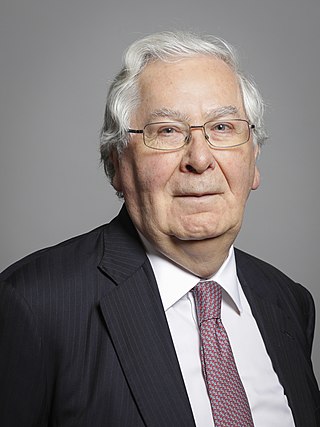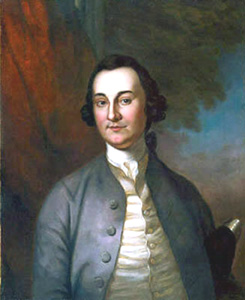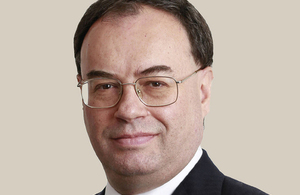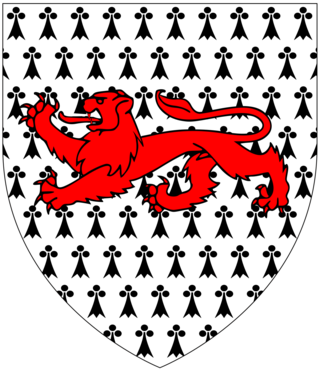Related Research Articles

The Bank of England is the central bank of the United Kingdom and the model on which most modern central banks have been based. Established in 1694 to act as the English Government's banker and debt manager, and still one of the bankers for the Government of the United Kingdom, it is the world's eighth-oldest bank.

Mervyn Allister King, Baron King of Lothbury is a British economist and public servant who served as the Governor of the Bank of England from 2003 to 2013. He is a School Professor of Economics at the London School of Economics. He is also the Chairman of the Philharmonia.

William Bingham was an American statesman from Philadelphia. He was a delegate for Pennsylvania to the Continental Congress from 1786 to 1788 and served in the United States Senate from 1795 to 1801. Bingham was one of the wealthiest men in the United States during his lifetime, and was considered to be the richest person in the U.S. in 1780.

The governor of the Bank of England is the most senior position in the Bank of England. It is nominally a civil service post, but the appointment tends to be from within the bank, with the incumbent grooming their successor. The governor of the Bank of England is also chairman of the Monetary Policy Committee, with a major role in guiding national economic and monetary policy, and is therefore one of the most important public officials in the United Kingdom.
Benjamin Tasker Sr. was the 21st Proprietary Governor of Maryland from 1752 to 1753. He also occupied a number of other significant colonial offices, including, on various occasions, being elected Mayor of Annapolis.

Samuel Ogle was the 16th, 18th and 20th Proprietary Governor of Maryland from 1731 to 1732, 1733 to 1742, and 1746/1747 to 1752.

George Plater III was an American planter, lawyer, and statesman from Saint Mary's County, Maryland. He represented Maryland in the Continental Congress from 1778 to 1780, and briefly served as the sixth Governor of Maryland in 1791 and 1792.
Gabriel Johnston was a British colonial official who served as the sixth governor of North Carolina from 1734 until his death in 1752. He was the longest serving governor, holding the office for 18 years.

Andrew John Bailey is a British central banker and Governor of the Bank of England since 16 March 2020.

Joan Gideon Loten was a Dutch servant in the colonies of the Dutch East India Company, the 29th Governor of Zeylan, Fellow of the Royal Society and Fellow of the Society of Antiquaries of London. During his time in the colonies he made collections of natural history. In 1758 he moved to Holland. Nine months after his return from the Dutch East Indies he moved to London, where he lived for 22 years and interacted with scholarly societies and shared his natural history illustrations and collections. The sunbird species Cinnyris lotenius is named after him
A Deputy Governor of the Bank of England is the holder of one of a small number of senior positions at the Bank of England, reporting directly to the Governor.
Thomas Cooke was an English merchant and banker. He was Governor of the Bank of England from 1737 to 1740. He had been Deputy Governor from 1735 to 1737. He replaced Bryan Benson as Governor and was succeeded by Delillers Carbonnel.
Charles Savage was Governor of the Bank of England from 1745 to 1747. He had been Deputy Governor from 1743 to 1745. He replaced William Fawkener as Governor and was succeeded by Benjamin Longuet.
William Hunt was Governor of the Bank of England from 1749 to 1752. He had been Deputy Governor from 1747 to 1749. He replaced Benjamin Longuet as Governor and was succeeded by Alexander Sheafe.
Charles Palmer was Governor of the Bank of England from 1754 to 1756. He had been Deputy Governor from 1752 to 1754. He replaced Alexander Sheafe as Governor and was succeeded by Matthews Beachcroft.
James Sperling was Governor of the Bank of England from 1773 to 1775. He had been Deputy Governor from 1771 to 1773. He replaced Edward Payne as Governor and was succeeded by Samuel Beachcroft. Sperling's tenure as Governor occurred during the Bengal bubble crash (1769–1784).
George Peters was Governor of the Bank of England from 1785 to 1787. He had been Deputy Governor from 1783 to 1785. He replaced Richard Neave as Governor and was succeeded by Edward Darell.
Godfrey Thornton was Governor of the Bank of England from 1793 to 1795. He had been Deputy Governor from 1791 to 1793. He replaced Samuel Bosanquet as Governor and was succeeded by Daniel Giles.
Benjamin Winthrop was Governor of the Bank of England from 1804 to 1806. He had been Deputy Governor from 1802 to 1804. He replaced Joseph Nutt as Governor and was succeeded by Beeston Long.

Samuel Drewe (1759–1837) of Kensington in Middlesex, was Governor of the Bank of England from 1828 to 1830. He had been Deputy Governor from 1826 to 1828. He replaced John Baker Richards as Governor and was succeeded by John Horsley Palmer.
References
- ↑ Governors of the Bank of England. Archived 2012-02-12 at the Wayback Machine Bank of England, London, 2013. Archived here. Retrieved 14 February 2016.